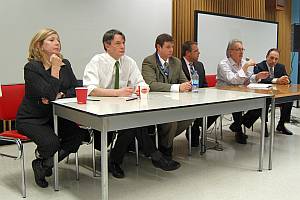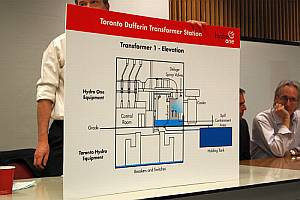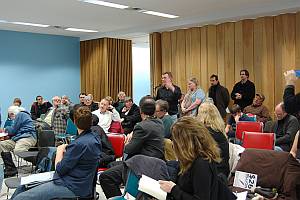
Centre For Local Research into Public Space (CELOS)
Minutes from the Post-Blackout Community Meeting on January 22nd, 2009, Parkdale Public Library, 7-8 pm
Councillor Gord Perks emailed these minutes on January 23
Meeting organizers:
MPP Cheri Di Novo
Councillor Gord Perks, Councillor, Ward 14, Parkdale High Park
Representatives from Toronto Hydro:
Blair Peberdy, Ivano Labricciosa, Ben LaPianta,
Representatives from Hydro One:
Laura Cook, Mike Penstone,
Representatives from the City of Toronto
Kevin Sack, Director of Corporate Communications
Nestor Uhera, Energy Efficiency Office
MPP Di Novo opened the meeting and welcomed everyone and explained the format for the meeting. She also thanked some of the community leaders who helped get the meeting organized.
Councillor Perks thanked City staff, the emergency operations staff and communications staff for a job well done.
Hydro One explained what caused the outage and what they are doing to avoid it happening again. Mike Penstone also apologized for the inconvenience it caused. He used a diagram of the transformer station to show what happened in the shared Hydro One and Toronto Hydro facility.
Mike showed the very large transformers and the fire protection system (deluge spray valve - six of them connected to a high pressure system). The valve open accidentally and caused a lot of water to pour into the station. Water drains into a holding tank (because the water could be mixed with oil) to protect the environment. The holding tank filled beyond capacity and water reached the equipment owned by Toronto Hydro. Also, The Hydro One equipment and sprinklers are on the floor above the Toronto Hydro equipment. There was some leaking into the Toronto Hydro Section. To prevent the water from contacting live transformers Toronto Hydro disconnected power. This prevented a much more serious and long lasting outage.
Toronto Hydro then had to dry and test the equipment to get it back in service. Hydro One has launched an investigation on what made the valve open and what is required in a new system to avoid this. Hydro One also noted that this equipment also sprayed water on the transformers during the big blackout and thought they had solved the problem with water going into the basement when the valve malfunctions.
Hydro One stated clearly they are now going to replace the entire fire suppression system, probably by the end of 2009. No specific date was provided. No decision has been taken about which fire suppression system will be used, however it should be noted that this project is the top priority at Hydro One. Hydro One feels that water fire suppression has some advantages in terms of cooling equipment and ease of clean-up.
Toronto Hydro then spoke and apologized for the outage and recognized the issues it caused. Toronto Hydro is a customer of Hydro One.Toronto Hydro spoke about the tough job it is to communicate during a power outage overnight. They spoke to media continuously throughout the blackout. Hydro answered 45000 calls in 24 hours - well beyond their maximum. First hour of the outage caused the telephone system to fail temporarily immediately after the blackout started. They are going to expand the capacity of their phone lines and it is a priority for their company.
QUESTIONS/CONCERNS:
Q: Residents wanted to know why they were last to get power back?
A: Hydro explained how each part of the station was put back online (lines need to dry out fully in order for them to work) and the fact that the part that feeds this community was the most damaged. Three of the four transformers were able to be restarted after being dried out. The fourth suffered worse damage and needed to be rebuilt. That is why one section of the blacked out area did not get power back until late on Friday.
Q: Hydro was asked why the website did not have information?
A: They were dealing with news media and got to the web later in the morning and that it will also now be a priority. Hydro communications people talked to people on blogs and now know they need to be more pro-active on the Web.
Q: Concerns about elderly and vulnerable and how they are recognized from the street level so people can help each other.
A: Councillor Perks clearly explained the many things the City did to check on the vulnerable.
- 7 receptions centres open, including one overnight reception centre
- city health inspectors visited over 1000 restaurants and food premises providing information on safe food handling during a power outage
- city staff visited 120 rooming houses to make contact with residents and help them get to warming centres
- public health officials also made contact with at risk people, including new and pregnant mothers, homeless and the elderly
- Solid Waste Management staff as well as staff from Transportation and Public Health knocked on doors of those residents that participate in their programme (side door collection, sidewalk clearing, etc)
- for those unable to check in on loved ones or elderly neighbours/friends, Access Toronto (416-338-0338) arranged for visits from staff from Transportation, Solid waste Management, or Public Health who worked together to check on residents
Concerns about radio stations and targeted announcements asking for timed messages.
Q: Conflicting information on freezing pipes and need to send correct information out.
A: All agreed that more work needed to be done to ensure that the information being communicated is correct and up to date
Q: Questions about how future questions would be answered if phone lines were overwhelmed.
A: Councillor Perks announced that by the end of 209 a new telephone system will be in place at the City of Toronto - 311. Call 311 for all your inquiries and they will have the most up to date information
Q: How many of these station exist in the city?
A: Over 30 stations connect provincial grid to Toronto Hydro.
Q: Resident pointed out a design flaw in holding tank (no alarm when tank begins to fill).
There is a water detector there that Toronto Hydro installed after the 2003 blackout. It helped to ensure water was off quick enough to avoid major problem. Had this not happened the event may have lasted for days.
Q: Concerns about differing explanations of the cause and then the correct explanation came out.
A: Crews arrived and operated in the dark and given the coldest weather of the year assumed it was a water main break. It should have been characterized as maybe a water main break. Hydro took responsibility for the mistake. Hydro apologized for the confusion.
Q: Concerns about power being on in some areas, off in others.
A: Hydro explained how they distribute power through lines with a given capacity that can fit a given geographical area. Also some places have dedicated feeders for large loads (Hospitals, large manufacturing facilities, etc). It should also be noted that Hospitals have their own back up generators.
Q: Will station be staffed until problem has been rectified?
A: The station is now staffed 24/7 until issued is solved.
Q: Asked for "doors open" to come and see the station.
A: Toronto Hydro is willing to take people on tours. Hydro One is concerned due to the high voltage. Toronto Hydro will consider placing images of the vault on the web.
Q: One resident, a former European electrician, said he doesn't feel like Toronto is first world. Feels that water is inappropriate suppression device and that current system is doomed to fail.
A: Toronto Hydro doesn't use water for suppression but Hydro One does. Also, Councillor Perks talked about how brittle and fragile the provincial electricity system is with large centralized generators and transmission choke points. Toronto is examining multiple "distributed" generators, and an interconnected "smart grid" That's why we need to install things like windmills so we have other sources of power. Councillor Perks also explained need to fix old infrastructure and Toronto Hydro's plan.
Q: Concern about whether or not the city is prepared for a city-wide emergency.
A: Councillor Perks responded very well to this question and highlighted the planning guide that's on the web (www.toronto.ca/oem). Councillor Perks also stated city staff at all levels responded very well and reassured residents that we are prepared but there is always room for improvement. Councillor Perks also highlighted what police, TTC, public health, transportation and shelter staff did to respond during the outage.
Q: When will this problem be fixed?
A: Hydro One said they will hopefully repair problem by the end of the year. They are currently looking at which fire suppression system is the best for type of facility.
Q: One resident said City should have its own radio station.
A: Some residents said radio stations did not do enough.
Resident complained about the Toronto Star report on Sunday and said she is facing 20 to 30 thousand in damage and wants to know who to sue.
Hydro One said residents should look at their home insurance.
Q: Residents with boiler systems said they need different advice as they are on different systems. Boiler cracked and people need advice on what to do. Insurance won't cover the boiler.
A: Councillor Perks will alert the Office of Emergency Management and ask that this information be included in the guide available online (www.toronto.ca/oem)
Q: Resident asked that information on the specific locations of the outage be available in real time during an outage.
A: Toronto staff explained the map that was developed and posted online and Hydro undertook to do better at this in future.
Toronto Hydro has committed to putting together a newsletter to advise residents of what is happening and what will be done to rectify the problem as well as other important information relating to power outages. The newsletter will be distributed within the next few weeks.
From: P. W.
In January 2009 there was a power black-out in Toronto. It affected everything south of St. Clair, north of Queen, west of Spadina, and east of Jane. But some areas of the city had it easier than others. Some people in the area of Davenport and Oakwood simply lost their cable T.V. However, most houses lost their entire power supply.
After the black-out, a meeting was called by the people of Parkdale, local Councillor Gord Perks and M.P.P. Cheri Di Novo. It was held in a room under the Parkdale library. I went to the meeting with Jutta Mason, my sister A. and my six year old brother, N.. We got there at about 7:00. As we entered, I saw Gord Perks, Cheri de Novo and three other men. There were about 40 -50 other people - some journalists - but mostly citizens of the Davenport (like me) or Parkdale wards. Many of them were senior citizens.
They started the meeting when Gord Perks introduced the three other men. Two of them were from Hydro 1, the other from Toronto Hydro. Then, they began explaining the question everyone wanted answered: why did the power go out? If you haven’t heard, here’s the story. In the power building at Bloor & Dufferin there are rooms with large transformers. The room is sealed off. But, also in the room there is (was -they took it out) a sprinkler system. The system is there so if a transformer catches fire it can be put out. But in this case, it backfired. The system went off for no reason and the water from the sprinklers went into the holding tank. Then, because no one knew the sprinklers were on, no one stopped them. The holding tank backed up and then overflowed onto the floor and onto Hydro’s equipment which supplies the blacked-out area’s power. The equipment got wet and had to be turned off. That’s why we lost power.
When they finished the explanation they opened up the floor for questions. The first person to ask a question was a man about 50-60. He was mad about the telephone system for Hydro 1. He said that whenever he tried to call, it was busy. The second person to come up to speak was an Indian man about the same age. The first question he asked was, “how long does it take for the holding tank to fill up?” The answer was “about 90 minutes”. The man seemed a bit bewildered, then said, “90 minutes? Why don’t you use a sensor at the half-way mark - a little red button or something that flashes when the tank is half full? Then you have 45 minutes to come and turn it off.” This made a lot of sense to me. The next notable [the others mainly just came up and basically said “you didn’t do this right - you’re the pits”] person was a retired European electrician who made a point that there are no electric stations in Europe with water sprinkler systems. They all have a CO2 system to put out fires. Finally, Jutta came up and suggested we station someone in the power building. And it turns out that after the black-out, Hydro 1 put someone there to keep watch.
From: A. W.
Hostility, Impatience and Misunderstandings in the Blackout Discussion
We were one of the many west-end families that lost their electricity for twenty-four hours during Toronto’s huge blackout. As anyone will tell you, it was a great inconvenience to people because not only was the power out but it was out on the coldest night of the year.
The hassle that the blackout created made many people question the government’s response to this “emergency”, those in the past (the 2003 summer power outage, for example) and the possible citywide problems to come. Many people were and still are angry about how the blackout was handled and these concerns were voiced at a Parkdale ward meeting about a week after power returned.
Present at the meeting, among others, was Gord Perks, the Parkdale ward councillor, Cheri Di Novo, the M.P.P., and a spokesperson for Toronto Hydro. It was Ms. Di Novo who organized the meeting after hearing the suggestion from Jutta Mason, a Dufferin Grove community leader. The meeting took place at the Parkdale library and although most of the people were from the Parkdale ward, there were also Davenport residents (myself included) and even someone from the Trinity-Spadina area.
The meeting commenced with a general explanation of the Dufferin station system that controls the city’s power and what happened to that system that caused such an extensive power failure. This was an informative, interesting part of the meeting because it put a lot of what people were talking about into perspective.
While the explanation was being given about cause of the failure, two young photographers were taking pictures of the diagram being used and of people in the meeting. The camera flashes were distracting and some people who appeared to already have short fuses snapped at the photographers. One woman was embarrassed and retreated to a corner of the room. The second photographer was so offended that he left the meeting altogether. It was not a mature or positive way to begin the discussion.
So by the time people began asking questions to Mr. Perks and company, it seemed as if the meeting might turn into a shouting match. However even the angriest people remained quite civil and many of the people even offered suggestions for how the city could respond differently in the event of a future crisis. Some people also gave ideas on how to prevent another blackout. These suggestions helped the discussion remain on a positive note.
The questions and complaints were directed at many different sides of the issue. Many people were concerned about the conflicting information they received over the radio during the blackout. Others were annoyed that this power outage had been caused the same way as the last one in 2003. Certain individuals were just angry that a power outage happened.
And unfortunately, although people were reasonable throughout the meeting, after it ended, many of them appeared to show their true colours. Some people were swearing when we left and it was a very unpleasant way for the meeting to end. Being angry is understandable. Voicing opinions and frustrations can be a constructive way of resolving an issue, however it is almost embarrassing to see adults that cannot express those feelings in a mature way. We, as citizens, need to speak up when we feel that something is amiss, but it must be done in a thoughtful, respectful and mature manner or we lose our credibility.



 Show search options
Show search options






 You are on the [Minutes Jan 2009 Blackout Followup Meeting] page of folder [Power Blackouts]
You are on the [Minutes Jan 2009 Blackout Followup Meeting] page of folder [Power Blackouts] For the cover page of this folder go to the
For the cover page of this folder go to the 

